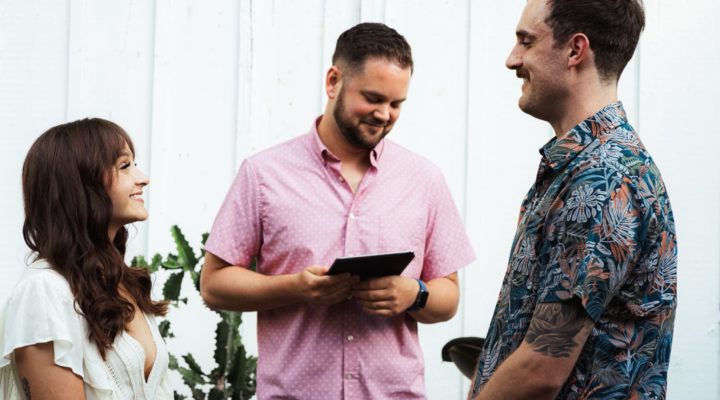If the COVID-19 pandemic is accelerating the pre-existing trend away from church weddings, some ministers say it’s also inspiring a surge in intimate ceremonies with faith as a driving force.
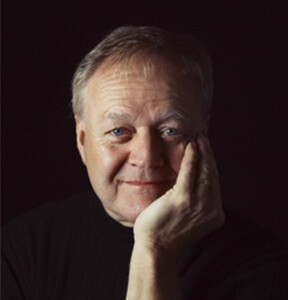
Harry Wooten (Photo/Royal Lane Baptist Church)
“I have done twice as many off-campus weddings in alternative settings as I have traditional, in-church ceremonies,” said Harry Wooten, minister of music at Royal Lane Baptist Church in Dallas and supervisor of its widely popular wedding ministry. “I have been heartened by the fact that even in non-sacred settings, these couples often want their ceremonies to be overtly and very meaningfully sacred.”
Wooten and other wedding officiants describe a pandemic movement toward much smaller, simpler ceremonies, a creative use of teleconferencing technology and an acknowledgment of the importance of faith in marriage.
“I have been so warmed by the fact that so many of these couples are really wanting to start their relationship together in the context of a spiritual life and make that part of their journey,” Wooten said.
The pandemic also has pushed churches to make changes that have led some couples to balk, including strict limits on number of guests and witnesses who may attend weddings. Royal Lane Baptist requires couples to sign a COVID addendum requiring practices such as social distancing and the wearing of masks, Wooten said.
The church also has removed Bibles and hymnals from the backs of pews, which are alternately roped off to minimize the spread of the virus by physical contact. The sanctuary is sanitized after each ceremony.
“We tell our clients that we are willing to host them but there are restrictions that match those demanded by the city and the county,” Wooten said. “Everyone has either postponed or said ‘OK, we can live with that.’ In just a few circumstances I know couples who chose to go off site.”
And what the weddings at the church have lacked in frequency — with one or two in a month compared to about that many per weekend pre-pandemic — they have made up for in creativity, he said.
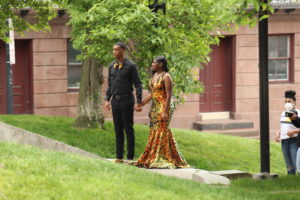
A socially distanced wedding in Baltimore, Md., in May 2020. (Photo/Elvert Barnes/Creative Commons/License: https://bit.ly/1xeTh7v)
Most have used some form of video conferencing to enable larger numbers of friends and family to attend. And some have arranged drive-by wedding parties in highly decorated vehicles. “They are very festive. They stand in sunroofs and drive by slowly and yell and scream. It is very warm and meaningful,” Wooten said.
One source of that meaning for some couples derives from the simplicity the pandemic has forced on the wedding planning process, said Ben Burton, a hospice chaplain in Louisville, Ky., and pastor of Canmer Baptist Church in central Kentucky.
Burton and his wife, Sara, were married Sept. 12 in a friend’s backyard with fewer than 20 people present. It was not how they originally envisioned their ceremony.
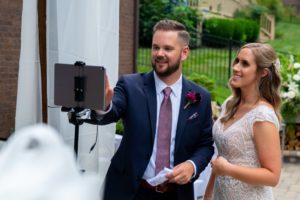
Ben and Sara Burton, moments after their September wedding, thank friends and family who attended through Facebook. (Photo/Courtesy of Ben Burton)
“I think COVID has shown us the reality of what is necessary and what is ultimately meaningful, and for us that translated into a much smaller wedding than we may have had in other circumstances,” he said.
The desire to keep participants and guests safe requires a resourcefulness not typically associated with pre-pandemic wedding planning. For Ben and Sara, that included creating a Facebook group to provide wedding updates and livestreaming to 300 virtual guests. They also hired a local restaurant and florist struggling in the pandemic economy. “We wanted to empower local people and local business owners,” he explained.
Burton said he hopes these trends continue after the disease abates.
“If somebody’s coming to me for advice, I would say you don’t need to do these $40,000 and $50,000 weddings,” he said. “All you ever hear about when it comes to wedding planning is that it’s stressful, and it could be, but we had our wedding planned in three weeks.”
The pandemic has helped people discern what matters most in their lives and, by extension, in their weddings, Burton said. “It would have been great to have more family at our wedding, but we had who we had and ultimately that’s all we needed.”
Couples are coming forward already instilled with that attitude, said Rob Lee, pastor at Unifour Church in Newton, N.C.
Lee said he agreed to officiate a recent wedding on the condition there could not be a large number of people in attendance. The couple agreed, explaining that the virus had taught them it was their bond that mattered, not the size of the crowd.
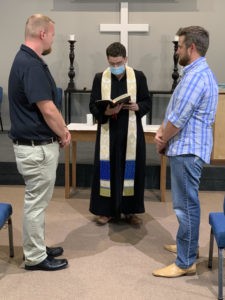
Rob Lee officiates a small wedding at Unifour Church during the COVID-19 pandemic. (Photo/Courtesy of Rob Lee)
“It was a beautiful moment realizing and recognizing that love is about taking risks in the middle of this pandemic,” he said. “We may have limited numbers, but love is still there and keeps things in perspective when the world is falling apart.”
Some of the weddings Lee has officiated in 2020 have been off-site, he added. “But that’s OK.”
“I don’t think that’s inherently wrong because what I see is people who have gone through formation with me desiring a religious service, just not at church.”
And it’s too early to determine if the pandemic will hasten the end of church weddings, he added. “It may be accelerating the demise of church, but on the flip side it may not.”
Lee explained he married a couple this year who previously did not have a church home, and who expressed interest in being part of the Unifour Church community.
“If the pandemic has taught me anything, it is to be content with not knowing because I know the one who knows,” Lee said. “We are going to have to be content with not being clear right now. This is just a murky time.”

